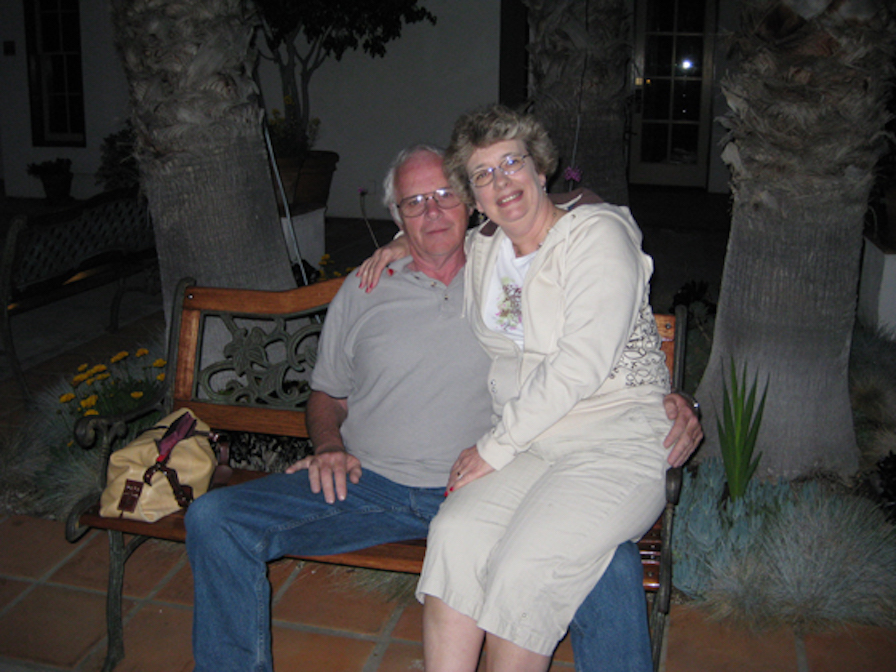Challenge Cancer 2020 is our visionary initiative to cut cancer rates in Maine by 2020. Our goal for a Maine less burdened by cancer requires active participation from people and communities across the state. Our success depends on inviting key stakeholders to the table to share strategy, tactics, and experience.
We recently sat down with one of our stakeholders: Sharon Snell, President of Dean Snell Cancer Foundation (DSCF). Since 2012, DSCF has received consecutive Maine Cancer Foundation grants totaling $52,500 to support transportation for Midcoast Maine cancer patients seeking treatment.
“It was like a tsunami,” said Sharon Snell, President of Dean Snell Cancer Foundation. A resurgence of esophageal cancer in her husband Dean upended the family’s hope for recovery. He was diagnosed in June 2008, and by fall 2009, lost his life to the disease.
The morning after Dean’s passing, a condolence call from an oncologist at New England Cancer Specialists (where Dean received treatment), planted the seed for a way to honor his memory. “I said to [the oncologist], ‘I’d like to start a memorial fund in Dean’s memory.’” The idea ricocheted through Dean and Sharon’s family, including their six adult children, and landed with a resounding yes. The family decided to start an independent foundation and the Dean Snell Cancer Foundation (DSCF) was born fast enough to be included in Dean’s obituary. Days after his passing, $4,000 was raised in memorial donations alone.

Since 2009, DSCF has raised over $400,000 for New England Cancer Specialists [NECS] patients. “NECS [supports] cancer patients up and down the Midcoast area. We’ve helped people from Vinalhaven to Sabattus,” Sharon noted. The organization is entirely volunteer-run, and the funds raised go directly to individual patient needs.”There are as many situations as there are patients,” said Sharon. “Early on we decided we didn’t want anyone to fill out an application or intake form. There are no restrictions and no formulas. We only provide help where needed.”
The foundation works with NECS’ financial advocate, who shares a monthly list of patients and their requests. Those seeking additional support are identified by patient number only, along with location, age, and other relevant information to support the requested assistance. “Some people can’t work because of treatment, or they don’t’ have enough money to cover their deductible,” said Sharon. “Sometimes they need help to pay utilities or rent, and many requests are around transportation.”
Transportation for cancer patients is an easily forgotten barrier in the midst of diagnosis, treatment, and post-treatment care. Many professionals in the field note transportation issues as a complex continuum because people’s circumstances are always changing. Some Mainers may have short-term needs for transportation (for example, someone whose energy is depleted during treatment, sapping their ability to drive), while others might have no access to a vehicle, might live remotely, or whose friends or family members can’t take time from work to offer a ride.
As the Snell family learned during Dean’s treatment, one trip to Dana-Farber in Boston costs nearly $80. “Our family is big, we had a lot of support, but not everybody has that gift,” she says. Additional costs for food and lodging may deter some people from receiving second opinions or life-saving treatment because they cannot afford the expenses.
Sharon sums up the work of DSCF very simply: “We give choices to patients who feel stuck.” Some of her favorite stories include funding a woman’s trip to Boston for a second opinion, and subsidizing the cost of Amtrak tickets for a man to spend time with his ailing partner in Massachusetts. “If we can be a small vehicle to reduce stress and worry, well, it does almost as much for us as it does for the patients,” Sharon reflected. “Dean would be so moved.”
In late spring, Sharon joined us for the Maine Cancer Transportation Summit. Transportation providers and Mainers affected by cancer were in attendance to discuss potential solutions for improving transportation options for cancer patients.
